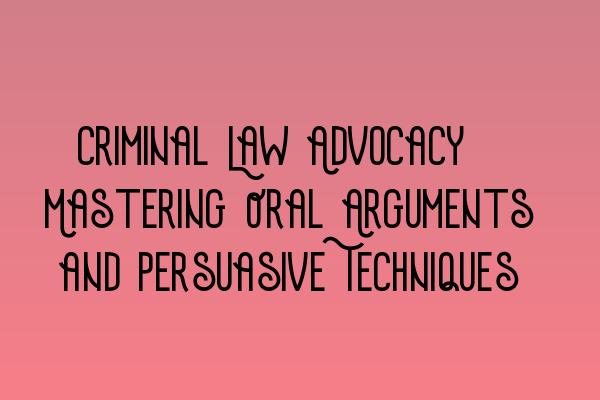Criminal Law Advocacy: Mastering Oral Arguments and Persuasive Techniques
Welcome to SQE Criminal Law & Practice Law UK! Today, we will delve into the art of criminal law advocacy.
As a criminal law solicitor, mastering oral arguments and persuasive techniques is essential for successfully representing your clients
in court. By understanding and effectively utilizing these skills, you can significantly increase your chances of achieving favorable outcomes.
1. Crafting a Compelling Opening Statement
An opening statement is your opportunity to capture the attention of the judge and jury from the start. It should be concise, persuasive,
and tailored to the specific case at hand. Use powerful keywords that highlight the key elements
of your argument and draw the listener in. Remember to provide an overview of your theory of the case and outline the evidence you
intend to present to support your position. For more insights on crafting effective opening statements, check out our related article:
SQE 1 Practice Mocks FLK1 FLK2.
2. Effective Use of Body Language
Non-verbal cues play a significant role in how your message is received. Maintain good eye contact with the judge and jury to establish
credibility and demonstrate confidence in your arguments. Use gestures and facial expressions to emphasize important points and show
passion for your client’s case. Additionally, pay attention to your posture, as it can convey authority and command attention. For
more tips on body language in advocacy, we recommend reading our related article: SQE
2 Preparation Courses.
3. Mastering the Art of Persuasive Speaking
Persuasive speaking involves effectively presenting your case in a clear and cogent manner. Use powerful language
techniques such as rhetorical questions, vivid imagery, and logical reasoning to sway the judge and jury in your favor. Support
your arguments with compelling evidence and expert testimony. Practice active listening to respond
to opposing arguments and address any potential weaknesses in your case. Further enhance your skills in persuasive speaking by checking
our related article on SQE 1 Preparation Courses.
4. Adapting to Different Audiences
Every case may involve diverse audiences, including judges, juries, and sometimes members of the public. It is crucial to adapt your
advocacy techniques to suit each audience. Tailor your language and arguments accordingly, simplifying complex legal jargon when presenting
to non-legal professionals. Make use of analogies and real-life examples to help the audience understand and relate to your client’s
situation. For more insights on effectively communicating with different audiences, check our related article on SRA SQE Exam Dates.
5. Mastering Cross-Examination Techniques
Cross-examination is a critical component of advocacy that requires careful preparation and effective questioning techniques.
Questioning skills such as open-ended questions, leading questions, and the ability to anticipate
responses are vital for discrediting opposing witnesses or eliciting favorable evidence. Mastering the art of cross-examination
takes practice and experience, but its impact on the outcome of a case should not be underestimated. For more insights on mastering
cross-examination techniques, we recommend reviewing our related article on SQE 1 Practice Exam Questions.
